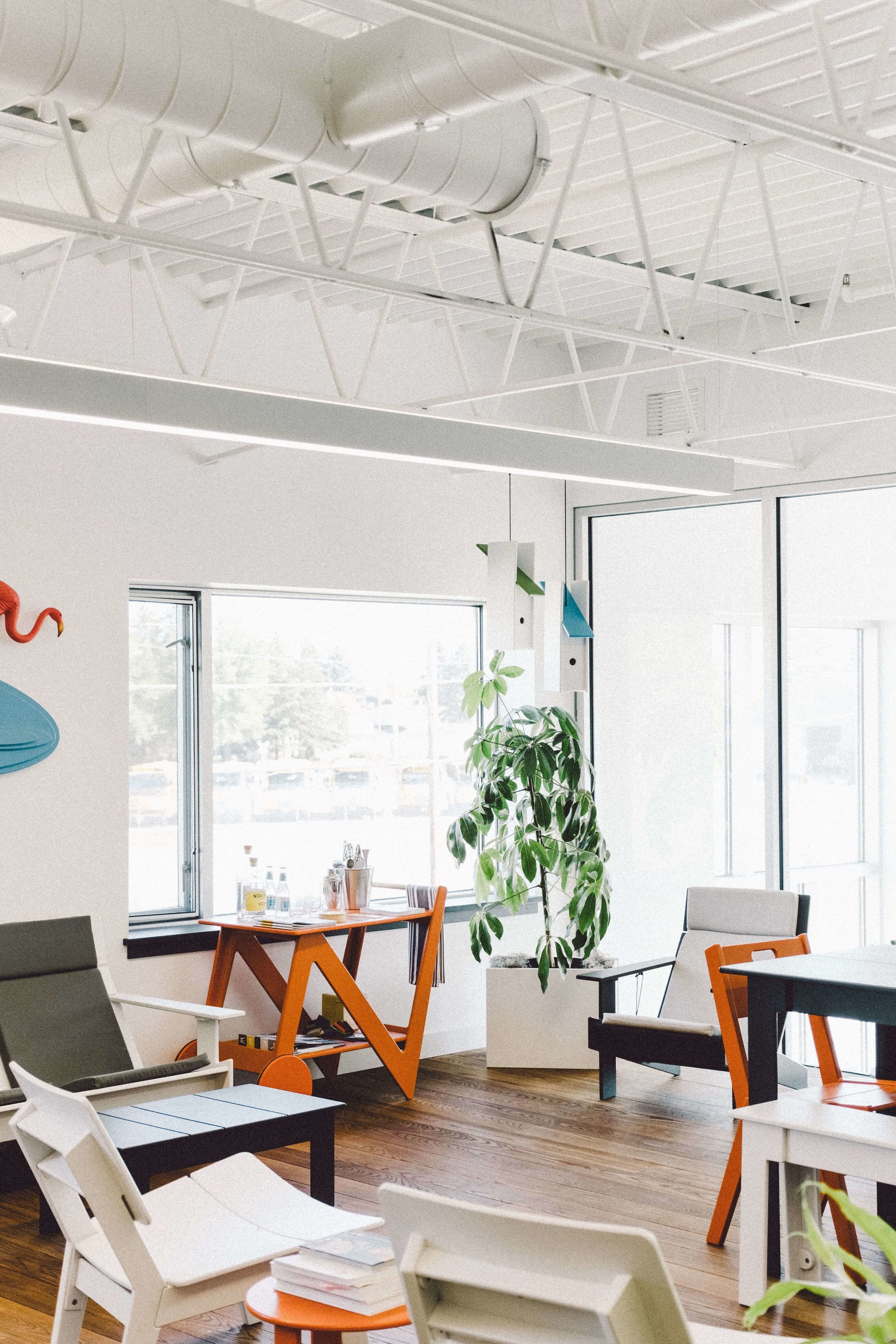Good Company: Duluth Furniture Designer Greg Benson on Saving the Planet, One Recycled Chair at a Time
What does it really mean to be an environmentally friendly maker? Don’t ask Greg Benson, CEO of Minnesota’s
. He’s sworn off the term.“I stopped using it a long time ago,” Benson says. “Everybody used to say ‘green,’ and people don’t say that so much anymore. Now it’s ‘environmentally conscious.’ But we want to be even more specific than that. Because when you say ‘environmentally friendly,’ or ‘environmentally conscious,’ what does that even mean?”It’s a strange thing to hear from a guy who owns a company that makes artfully designed outdoor furniture out of recycled milk jugs. It’s even stranger if you consider that this same guy is also the co-owner of two other ‘green’ design businesses—Epicurean and Intectural, also based in Duluth—all of which are quietly becoming eco-industry mainstays. But Benson’s opposition to the buzzwords of his trade isn’t just for show—and it definitely doesn’t mean that he isn’t serious about reforming a manufacturing landscape that too often makes the planet pay the price for good design. It’s just that he believes you can have a little fun while you’re working to build a brand that takes environmental friendliness to a whole new level. And you might even be able to lollygag around a bit while you’re doing it.
If that sounds paradoxical, get comfortable with that feeling. Because at every turn, the story of Loll Designs challenges the narrative that the only way to save the world is to buckle down and deny yourself the things you enjoy—and the narrative that the only way to grow a business is to grow up and get serious.
You’d think Benson would have started the journey that lead him to Loll in a furniture-design masters program, or maybe in a particularly environmentally minded MBA. But his path actually began in the woods of central Minnesota—and he took a major detour through the skate park business along the way.“I don’t know if I really thought about design too much as a kid,” Benson says. “I didn’t know anybody who was really into it. I was more into being outside, playing in the woods, catching turtles, stuff like that.”That early propensity for play paid off in an unexpected way. Benson befriended classmates and neighbors Scott and Brennan Olson, who founded an iconic company whose name would become synonymous with their product: Rollerblade Inc. Benson stayed in touch as life took him out of their shared hometown of Bloomington, Minnesota, to a literature degree in Duluth. After college, Rollerblade offered him a full-time job.
“I didn’t identify as a rollerblader,” Benson says. “That’s not what I did. I was a rock climber; I would backpack, I would go canoeing. I rode my bike a lot. I was really more of an outdoor person, and I still am. I did not identify with skate culture. I didn’t listen to the music they listened to; I didn’t look at their magazines.”
But Benson took the offer anyway, and Rollerblade took him to southern California, where he dove into sales and marketing for the company. Decades later, Benson still has a bit of a SoCal lilt to his voice.“Eventually I ended up doing events for them around the country,” Benson says. We did 30 cities a year— we even held an event outside the Super Bowl. We would set up ramps, and all these rollerbladers and skateboarders would show up to skate on them. And they always said the same thing: “We want skate ramps in our town.”
Skater or no, Benson saw an opportunity. If the modular, portable skate ramps they used at rollerblade events could be replicated for a more-permanent use at a price cities could afford, he could give those kids the ramps they wanted, no matter where they lived. Working with his brother Dave and fellow Minnesotan Tony Ciardelli, they founded TrueRide in 1997, just prior to the birth of the X Games had brought skating fully into the American mainstream. Fast forward 10 years, and the three had built more than 450 skate parks across the country.Benson insists his TrueRide days never converted him to the church of skating—nor did he really see himself as a designer during those years, despite making hundreds of sculptural, custom-designed creations that functioned as skatable land art. “It’s just never been my thing,” Benson admits. “What we saw was an opportunity to build a company building skate ramps, and we did that.”
But if you know anything about skate culture, you know it’s defined by a kind of punk-rock, DIY ethos that doesn’t ask permission to make cool stuff. There’s something of that spirit in Benson’s work—and no more so than in the story of how he created Loll, the company that would become his best-known legacy. On what he insists was a random day, he was driving around Duluth and noticed that just about every front yard had an Adirondack chair or two in it, standing at the ready for a summer barbecue or a bonfire. “I just personally liked Adirondack chairs,” Benson says. “I just thought, ‘Why not make one?’”
Benson, of course, is being modest about how ambitious even that single chair was. After all, he likely couldn’t have followed the Adirondack lark to such a beautiful conclusion if he hadn’t already built a Duluth manufacturing center for TrueRide that was fully tricked out with computerized cutters and the latest digital design tools. Not to mention Benson’s other lightning-bolt moment: that he could build his chair out of plastic scraps from the ramps themselves.
“They’d literally just go to a landfill, and some of these chunks and pieces were pretty big,” Benson says. “We knew these outdoor chairs needed a lot of maintenance; even if you did that, they still didn’t last all that long. We’d already dealt with [those kinds of durability and weatherization challenges] on the skate ramps and found materials that we knew worked—and because we weren’t skaters, we weren’t just stuck in, ‘How can we use these materials in the skate industry?’ I don’t know. It was just like, ‘Why not make a chair?’”“Why not?” moments like these don’t always lead to an internationally recognized company that employs 70 people and has spawned buzzy articles in The Atlantic magazine about the potential of small manufacturers to revitalize post-industrial towns like Duluth. Nor do “Why not?” moments cultivate empires like the three green businesses Benson and his partners refer to collectively as Good Sheets. In addition to Loll, there’s also kitchen utensil maker Epicurean—which uses scraps from building new skate ramps to make products like cutting boards— and Intectural, which sells eco-conscious materials for commercial architectural and design projects.
And happy accidents definitely don’t produce products that look as gorgeous as everything that the three brands make. Just look at Loll’s Rapson Cave Chair, a futuristic lounger that’s adapted for the outdoors but stays true to the original furniture drawings of midcentury architect Ralph Rapson.
Benson’s holistic, practical approach to design and the company’s instinct for an ultra-modern aesthetic have been integral to their success. That’s why he’s worked so hard to collaborate with brands like De- sign Within Reach, as well as superstar architects like Duluth’s David Salmela, who designed Lussi Chair, a rectilinear stunner that, according to Loll’s website, “expands our collective consciousness of what a modern patio chair ought to be.” He also works with top industrial designers like Chicago’s Studio Murmur and sculptor/industrial designers like Los Angeles’ Brendan Ravenhill.“It’s almost always the aesthetics in the design,” Benson says. “You look at a chair, and you either like how it looks, or you don’t; that’s why you buy it, or you choose something else. But when you get past that, you might say, ‘Where is it made? What is it made of?’”That’s where the milk jugs come in.
As Loll grew, Benson and his business partners began to wonder whether there might be an even more environmentally conscious way to make an outdoor chair. It wasn’t just that the three had started to drift away from TrueRide—they sold the business in 2007—and started to wonder what they’d do when those post-industrial skate park scraps dried up. They’d also realized that they could have a bigger impact if they pivoted to post-consumer plastics. And maybe their designs could have a bigger impact, too.
“What a lot of people don’t realize is that all post-industrial plastic is black,” Benson says. “Milk jugs, on the other hand, are great, because there’s no pigment. You can add whatever colors you want. And when you’re done with them, they can be recycled again.”Nowadays, a single Loll chair keeps over 400 milk jugs out of the landfill. Multiply that number by the company’s annual sales numbers, and Benson estimates that “well over 100 million jugs” have been repurposed as stylish seating and tables that most of us would never realize began their lives as containers for skim and 2%.
If you’re buying a No. 9 Rocker for the look, you might not realize just how far Loll goes to shrink their environmental footprint. If you decide to refurnish your patio, Loll invites you to send your patio chair back to them to be recycled into something new. You might not even notice that every item in your Loll package is recyclable or reusable. Even the screwdriver is made of their own plastic and designed to be used beyond the initial chair assembly. Dig even deeper, and you’ll learn that Loll is fully designed, manufactured and sold domestically—a rare feat in a furniture industry that’s often reliant on underpaid international workers and constant, fuel-intensive shipping.But talk to Benson, and he won’t brag about this radically holistic approach to eco-consciousness. For him, outsourcing to China or swathing his green products in pounds of non-recyclable packaging were simply never options in the first place. In his eyes, the real challenge has to do with taking planet-friendly practices mainstream—and to do that, he needs to sell consumers on a lifestyle that puts more people out in nature, enjoying a bit of good company in a stylish chair.
“Loll got its name from the word ‘lollygagger,’” Benson says. “But we’ve sort of redefined the term: A lollygagger is someone who wants to play hard and work hard but relax hard, too—ideally in the outdoors.”It’s a funny sentiment, coming from a guy from a place as cold as Duluth. But spark up a campfire and pull up a Loll chair, and you might find yourself enjoying a starry winter night anyway.
Images courtesy of Attilio D’Agostino.
This story originally appeared in ALIVE Volume 18, Issue 1,
. You can
or pick one up
.









